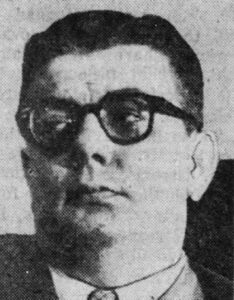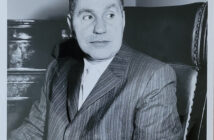Today I would like to celebrate the life of my good friend, the late Judge James Zafiratos. If it weren’t for the bad cops in Elmwood Park, Illinois (who were eventually forced out of the Elmwood Park, Illinois, Police Department), that brought a bogus case against me in 1992, I probably would not have had the pleasure of knowing Judge Zafiratos. He deserves far more than the brief mention that he received in Addendum Eight. The Judge was a man’s man. God rest his soul.
Before I start sharing some interesting information about James Zafiratos, I will tell you a bit about my late step-uncle, Romie J. Nappi, and his role with the Cook County judiciary. Romie was a political fixer and labor union racketeer for the Chicago Outfit for many years (please read the previous addendums for more details, including several FBI 302 reports and other exhibits, that support my information via links located at the bottom of this page). My late father, Armando “Mondo” Fosco, was always by Romie’s side. Despite his size and reputation as a hard man, Mondo was a discrete presence. His ability to keep out of the limelight meshed well with Romie’s attitudes towards public attention.
In his active years, Romie had personal friendships and/or serious acquaintanceships with eight Chicago mayors. The first was Edward J. Kelly, the 46th Mayor of Chicago, who served from 1933 to 1947. With the exception of David Duvall Orr, Romie personally knew every Chicago mayor from Kelly to Richard M. Daley.
According to my late father, one of the Outfit’s favorite Chicago mayors (in my father’s lifetime) was Harold Washington. I had the opportunity to ask my father what made Washington so special. My dad replied, “Washington lets us do whatever we want to do – without giving us any problems.” I was too green-behind-the-ears at the time to understand what my father meant by “us.” I later learned that “us” meant the Chicago Outfit’s then First Ward.
In the scope of his important responsibilities on behalf of the Chicago Outfit, Romie discreetly weighed in very seriously on decisions that went into securing endorsements from the Chicago political machine for judicial candidates and appointing a lot of judges to the bench in Cook County, and in some cases throughout the State of Illinois. Romie’s influence was mostly relevant to judges (or soon-to-be judges) of Italian and Greek descent (but not limited to those ethnicities). Romie also secured desired assignments for judges. Romie was heavily involved in various important backdoor judicial processes as early as the 1950s.
Murray “The Hump” Humphreys (originally brought in by Al Capone) and Gus Alex worked very closely with Romie and my father in the development of mastering the operation of political and labor racketeering. By the early 1970s, Romie was the Outfit’s point man in these matters, a state of affairs that would persist until the mid-1990s. This promotion was made possible because of Anthony “Joe B” Accardo and Joseph Aiuppa, who well knew how effective Romie and Armando Fosco, were, and because of their low-key public profiles.
To be clear, almost every Italian and Greek judge appointed to the bench and/or who sought endorsement by the Chicago political machine, or who wanted specific assignments, between the 1950s and the early to mid-1990s accomplished their goals largely because of Romie and his intimate network of highly capable colleagues.
An example of Romie’s direct and/or indirect influence over Italian and Greek American Cook County Judges, who were full judges (not associate judges), was cajoling them to vote certain ways in judicial elections. These judges elect the county’s chief judge and vote on which lawyers will be appointed as associate judges. These votes can be negotiated with various groups who control the Irish votes and others. The International Brotherhood of Teamsters and other unions have delegates in each state that vote on serious matters that were controlled by Romie and his colleagues as well.
Sometimes a judge would know of Romie’s involvement on his or her behalf, however, this was the exception and not the rule. Romie Nappi used the political machinery of Chicago to protect himself even while he was bending it to his will. Chicago’s old First Ward acted as a powerful buffer between Romie and all of Chicago’s aldermen. As a result of Romie’s discreet power behind the then First Ward, Romie didn’t have to personally connect with every Chicago Alderman in order to cause them to perform for him. The now old First Ward was the designated frontline mechanism that reached throughout the City of Chicago’s aldermanic system for Romie (along with his advisers and bosses), which insulated him quite well. The only way Romie could get into trouble for being a fixer would be if any of the power brokers within the old First Ward, my father or the top Chicago Outfit bosses, snitched on him.
Keeping the circle tight paid off. No one beefed on Romie, nor did they beef on anyone for that matter, and therefore Romie never got in any serious trouble in his lifetime.
By now it should start making more sense to some of you how relevant Romie’s aldermanic influence was during his discreet meetings over the decades with any one of the eight Chicago mayors who Romie dealt with during his 40-something year run as a vitally important political and labor union racketeer in Chicago.
As a side note, Romie’s and my father’s Al Capone-style of education in government and labor relations was taught to them by Al’s men, Jake Guzik and Murray Humphreys. Their unique education was eventually passed down to the now-retired Illinois State Senator Jimmy DeLeo by Romie personally, primarily during the early 1990s. The early 1990s marked the time in which Romie groomed DeLeo for his job as senator. Clearly, Romie’s substantial reach was not limited to the City of Chicago. The entire State of Illinois (and in some cases beyond) were well within Romie’s circle of influence. These details should help my steady readers understand why Romie only reported to the very top level within the Chicago Outfit.
Now that I have shared the information above, I will focus more on the late Judge Zafiratos.
Romie Nappi and James Zafiratos grew up as boyhood friends. As youngsters, Romie lived on the 900 block of Chicago’s West Polk Street, and James lived near Blue Island Avenue and Roosevelt Road, not too far from Romie. When Romie began working for his Uncle Tony Iorii (one of Al Capone’s most valued men) as an older teenager, James, who was 2-years Romie’s senior, went to school in pursuit of a law career. James’ mother was a major driving force behind her son’s dedication to pursuing graduate school. Therefore, Romie’s and James’ paths (temporarily) divided and went off in somewhat different directions, as they reached their late teens.
Somewhere around 1963 or 1964 a Chicago area Greek labor leader, by the name of Gus Zapas, brought one of his wishes to the attention of Romie, Gus Alex, and Murray Humphreys. Interestingly, Gus Zapas was extremely closely connected to Romie Nappi, my father, Armando Fosco, Murray Humphreys, Anthony “Joe B” Accardo, Joey Aiuppa, Gus Alex, and Sam Alex. Moreover, Gus Zapas was one of the initial high-level communicators between all of the aforementioned men in this paragraph and James R. Hoffa. Gus Zapas let it be known to Romie, Gus Alex, and Murray Humphreys that he was backing then-attorney James Zafiratos for Cook County Judge. In no time at all, Romie, Gus Alex, and Murray gave then James Zafiratos, Esquire, their full support, and the Chicago political machine quickly followed in lockstep.Despite Romie and James’ rich history dating back to somewhere around 1929, it was Gus Zapas that initially backed Zafiratos for judge. Of course, James and Romie’s longstanding friendship had created a powerful bond during their childhood that lasted for the rest of their lives. Romie was elated to be a part of helping James become a judge.
It is my desire to share in this record some interesting stories of this brilliant and endearing Judge’s experiences on the bench. I will not try to link together this mosaic of stories, aside to note that they will help you understand the unwavering goodness and steadfast demeanor that best illustrate James Zafiratos’ deep and abiding character.
One of the Judge’s first assignments as judge was to a division called obscenity-court. Cook County no longer has such a court. Obscenity-court handled drunks, prostitutes, and their johns for the most part. During one of His Honor’s first days in obscenity-court, just as court was about to begin, Zafiratos overheard the courtroom bailiff address all of the defendants who were in custody as lowlifes.
Before His Honor allowed the court call to begin, Zafiratos ordered the bailiff to stand in front of his bench. His Honor admonished the bailiff for insulting the defendants. He said, “Who are you to call these people names? You don’t know their stories. You don’t know why they’re here. You don’t know what kind of misfortune they may have experienced. These people are human beings like the rest of us. Now apologize to these people for the names that you called them. If I ever hear you again insult the people who come into this courtroom, I’ll find you in contempt and jail you.”
While assigned to court downtown, James experienced an interesting case before him. I believe the year was 1975. The criminal defendant that I will be talking about, Thomas D. Flanagan, Sr., Esquire, was a very close family friend of the then sitting Chicago mayor, Richard J. Daley. This close friendship pertained more so to the mayor’s son, John, which was well known throughout Chicagoland. Flanagan was accused of battering a Chicago Sun-Times employee who was trying to help the Sun-Times write a story on clout-heavy people among the Daley family’s inner circles whose reckless disregard for the law was well-known. As the battery case began progressing, Zafiratos was assigned to hear the case.
As soon as word broke that Zafiratos was going to be assigned the battery case, Richard J. Daley discreetly reached out to Romie to see whether Zafiratos was going to keep the case in front of him or not. It’s not uncommon for judges to recuse themselves when high-profile defendants with political clout come before them. With confidence, Romie predicted that Zafiratos would be up to the task. It should be noted that Murray Humphreys was already deceased, and Gus Alex was then already replaced as the Chicago Outfit’s head political and labor racketeer operative by Romie, which could support why Romie was contacted by Mayor Richard J. Daley prior to the start of the battery case. Alternatively, the fact that those in high channels were aware of the tight relationship Romie and James had together could have been the reason Mayor Daley contacted Romie with his question.
The trial took place, and Zafiratos found Flanagan not guilty. After the verdict came down, some asked James if he knew Mayor Daley. Zafiratos consistently replied, “Who doesn’t know Daley?”
A number of weeks after the trial ended, Mayor Daley asked the Judge to meet with him at his City Hall office. At this meeting, Daley asked why the judge decided not to recuse himself from the battery case. Zafiratos replied, “It’s my job to hear cases, Mr. Mayor.” Mayor Daley commended Zafiratos for doing his job in a fair manner. Daley gifted James with a token shillelagh. While smiling at the Judge, Daley said, “If you ever need anything.” James graciously accepted the mayor’s shillelagh and thanked him for it.
Shortly after being assigned to the Cook County’s Fourth District Courthouse in Maywood, Illinois, Assistant State’s Attorney Colin Simpson decided to enter Zafiratos’ courtroom to observe the proceedings. Zafiratos immediately noticed Colin’s entrance into the courtroom. As Zafiratos presided over the cases on his call, he started noticing Colin nod his head up and down after His Honor would issue a ruling. After other rulings, the Judge noticed Colin shaking his head back and forth. This went on for a little while.
All of a sudden, Zafiratos addressed Colin on the record and in open court by saying, “Mr. Simpson, I have noticed that you’ve been sitting in my courtroom for a while nodding your head up and down and back and forth. So, I have a question for you. Are you experiencing some kind of a problem with your neck? Is that why you are nodding your head up and down and back and forth?”
Colin immediately got up and left the courtroom.
One day while on the bench, an elderly lady appeared in Zafiratos’ courtroom. She had then recently stolen a shirt from a department store and she was pleading guilty to the crime. Zafiratos asked her why she stole the shirt. The woman explained that it was her husband’s birthday and that she didn’t have any money to buy him a gift. James sentenced her to a very short term of supervision. In Illinois, a sentence of supervision is an alternative to a conviction, where if a defendant avoids future arrests during the term of his or her sentence the case is disposed of satisfactorily and without a criminal conviction applied to the defendant’s official record.
After the Judge sentenced the elderly lady to supervision, he asked, “When your husband’s birthday comes around next year, if you don’t have money to buy him a gift, are you going to steal another shirt?
The elderly lady answered, “If he needs a shirt, yes, Your Honor.” Zafiratos laughed and allowed her to leave the courtroom without any further complications.
James was aware of how confusing his name could be to pronounce, and he addressed this in an amusing anecdote. Early in his judicial career, Zafiratos often told new professional acquaintances from the legal community, “Remember, Zafiratos rhymes with arthritis.”
Okay, so the Judge wasn’t a poet. However, he was a phenomenal son, husband, father, grandfather, and a great judge. Zafiratos cared about people. Not only did His Honor enjoy telling stories about different defendants that he dealt with in a reasonable and fair manner, but he loved to talk about the successes of his children, all who established amazing careers and families for themselves. God bless!
As I wrap up these stories about my good friend, I want to disabuse anyone from thinking that Zafiratos was a judge who conveniently found defendants not guilty because of who they were associated with, or related to, or because of other personal feelings he may have had. To illustrate this matter fully I offer you one last story.
The late Cook County Judge Adam Stillo had a relative that was charged with a serious crime many years ago. This defendant’s case went in front of Zafiratos. The Judge knew that the defendant was related to his good friend Adam Stillo. However, Zafiratos also knew that the justice system depends on impartial judges maintaining the rule of law. I, along with the Chicago legal community and all those James knew throughout his life, can attest that he took his responsibility to the law with the utmost seriousness.
To make a long story short, Zafiratos found the defendant guilty as charged and threw the book at him. I have decided to keep the nature of the crime and the defendant’s name discreet out of respect for the family of the late Adam Stillo, as I had a lot of respect for Stillo, and maintain a great deal of respect for his legacy.
As a side note, a family member of Judge Stillo seems to me to have joined his relative, Nick Spina, and (independently) another relative, who is the now late Sal Ferrara of Ferrara Candy Company, in sabotaging some of my respectable goals in more recent years. I attribute their motives to sabotaging my goals as follows: In the late 1990s, I had it out with Spina after he took advantage of Romie Nappi while Romie was suffering from senility. As far as Ferrara goes, I’ll just say that he was not a fan of American News Post. Despite my disappointment in Judge Stillo’s family members, again, I have decided to remain courteous to the Stillo family, solely because of my respect for the late Adam Stillo.
The Mafia Report Series:
5/13/20 – Mafia Report: Chicago Outfit
5/31/20 – Mafia Report: Chicago Outfit – Addendum One
6/4/20 – Mafia Report: Chicago Outfit – Addendum Two
6/24/20 – Mafia Report: Chicago Outfit – Addendum Three
7/18/20 – Mafia Report: Chicago Outfit – Addendum Four
6/11/21 – Mafia Report: Chicago Outfit – Addendum Five
8/28/21 – Mafia Report: Chicago Outfit – Addendum Six




